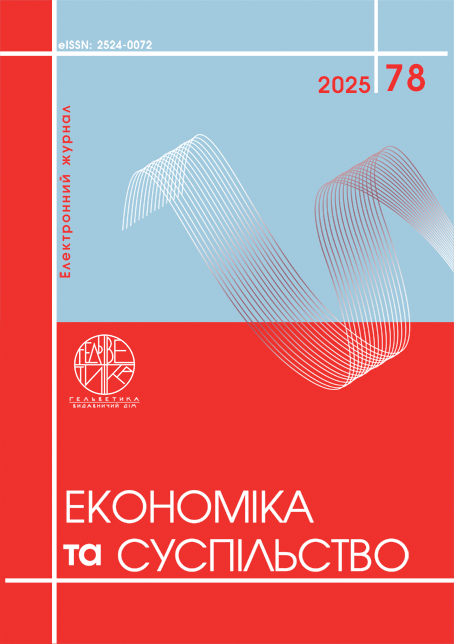PRACTICAL ASPECTS OF SELF-MANAGEMENT DEVELOPMENT OF FUTURE MANAGERS IN THE DIGITAL ENVIRONMENT
Abstract
The article focuses on the practical aspects of developing self-management skills of future managers in the context of a digital environment. Particular attention is paid to innovative approaches that are becoming increasingly relevant in higher education, such as Agile and Scrum methodologies, wellbeing culture, mental management, and gamification. These practices create conditions for enhancing adaptability, self-control, and psychological resilience among students, while also forming a foundation for professional growth and competitiveness in the labor market. The study emphasizes that digital tools in education are not limited to supporting the organization of learning tasks but act as drivers of personal development, helping students maintain motivation, strengthen cognitive abilities, and effectively cope with uncertainty. The practical part of the research was carried out on the basis of students of the Pridunai Branch of the PJSC “Interregional Academy of Personnel Management.” The empirical results demonstrate the degree of students’ involvement in digital innovations and their perception of self-management as an integral competence that combines organizational skills, critical thinking, and emotional intelligence. The integration of digital technologies with traditional methods of time management and self-regulation is argued to be a key prerequisite for forming flexible and competitive managerial personnel. The findings support the conclusion that self-management in the digital age should be understood as a multidimensional competence that unites cognitive, organizational, and psychological components. This perspective enables higher education institutions to design effective strategies for professional training, ensuring that future managers are prepared not only to achieve academic success but also to adapt quickly to the dynamics of global transformations in economy and management practices.
References
Волошина-Нарожна В. До проблеми саморегульованого навчання в умовах невизначеності. Науковий вісник НаУОА. Психологічні науки. 2023. № 3. С. 71–78.
Ганаба С. О. Саморегульоване навчання. Вища освіта України. 2023. № 2. С. 112–119.
Зелінська А., Тарасович Л., Лавриненко С. Цифрові компетенції як основа трансформації професійної освіти майбутніх менеджерів. Економіка та суспільство. 2023. № 49. DOI: https://doi.org/10.32782/2524-0072/2023-49-51
Бортун К. О. Цифрова грамотність як важливий вектор навчання студентів економічних спеціальностей. Електронний архів НАВС. 2024. С. 87–95. URL: https://elar.navs.edu.ua/items/394aa7bb-1fa9-4649-a576-7d390389468d
Лук’янова Л. Самоменеджмент у професійній діяльності. Київ : Освіта України, 2020. 248 с.
Удовіченко Г. М., Тимченко В. О. Цифрова грамотність як складова гнучкого навчання. Інтелект ХХІ століття. 2023. № 4. С. 56–64.
Sinek S. The infinite game. New York : Penguin Random House, 2019. 251 p. URL: https://simonsinek.com/books/the-infinite-game/
McKinsey Global Institute. The State of AI in 2022. New York : McKinsey & Company, 2022. 32 p. URL: https://www.mckinsey.com/capabilities/quantumblack/our-insights/the-state-of-ai-in-2022-and-a-half-decade-in-review
Voloshyna-Narozhna V. (2023) Do problemy samorehulʹovanoho navchannya v umovakh nevyznachenosti [On the problem of self-regulated learning in conditions of uncertainty]. Naukovyi visnyk NaUOA. Psykholohichni nauky [Scientific Bulletin of NaUOA. Psychological Sciences], no. 3, pp. 71–78. (in Ukrainian)
Hanaba S.O. (2023) Samorehulʹovane navchannya [Self-regulated learning]. Vyshcha osvita Ukrayiny [Higher Education of Ukraine], no. 2, pp. 112–119. (in Ukrainian)
Zelinska A., Tarasovych L., Lavrynenko S. (2023) Tsyfrovi kompetentsiyi yak osnova transformatsiyi profesiynoyi osvity maybutnikh menedzheriv [Digital competencies as the basis for the transformation of professional education of future managers]. Ekonomika ta suspilstvo [Economy and Society], no. 49. DOI: https://doi.org/10.32782/2524-0072/2023-49-51 (in Ukrainian)
Bortun K.O. (2024) Tsyfrova hramotnistʹ yak vazhlyvyy vektor navchannya studentiv ekonomichnykh spetsialʹnostey [Digital literacy as an important vector of training students of economic specialties]. Elektronnyy arkhiv NAVS [Electronic Archive of NAIA], pp. 87–95. Available at: https://elar.navs.edu.ua/items/394aa7bb-1fa9-4649-a576-7d390389468d (in Ukrainian)
Luk’yanova L. (2020) Samomenedzhment u profesiyniy diyalʹnosti [Self-management in professional activity]. Kyiv : Osvita Ukrayiny. 248 p. (in Ukrainian)
Udovichenko H.M., Tymchenko V.O. (2023) Tsyfrova hramotnistʹ yak skladova hnuchkoho navchannya [Digital literacy as a component of flexible learning]. Intelekt XXI stolittia [Intellect of the 21st Century], no. 4, pp. 56–64. (in Ukrainian)
Sinek S. (2019) The infinite game. New York : Penguin Random House. 251 p. Available at: https://simonsinek.com/books/the-infinite-game/
McKinsey Global Institute. (2022) The state of AI in 2022. New York : McKinsey & Company. 32 p. Available at: https://www.mckinsey.com/capabilities/quantumblack/our-insights/the-state-of-ai-in-2022-and-a-half-decade-in-review
Copyright (c) 2025 Тамара Гуменникова, Любов Лютфалієва

This work is licensed under a Creative Commons Attribution 4.0 International License.


